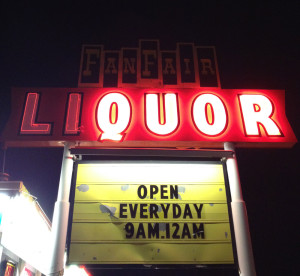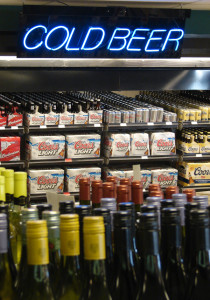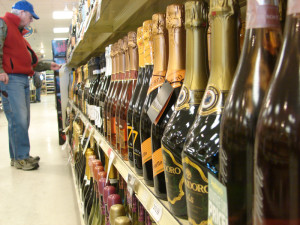
Shifting alliances! Backroom negotiations! Intervenors from out of nowhere! Betrayals! Ballot issues and counter-ballot issues multiplying — and dropping — like fruit flies! It’s the Great Colorado Booze War of 2016.
You can hardly tell the players even with a scorecard.
It all started when the big grocery chains decided, once again, that they want to sell wine and full-strength beer instead of being stuck with just watery 3.2 beer. They enlisted the support of the convenience stores and started running radio and TV advertising supporting the cause even though they haven’t settled on a specific ballot proposal.
They’re operating like the oil and gas business in reverse. The drilling industry has been running TV commercials for years against possible anti-fracking initiatives that haven’t been chosen yet.
The most recent development: The besieged liquor stores, apparently in the belief that the best defense is a good offense, last week filed a couple of initiatives designed to hurt the grocery chains.

One would specifically prohibit them from selling liquor, wine, full-strength beer — and, just for the fun of it, marijuana. The other would prohibit their employing anyone under the age of 21 if and when they become authorized to sell alcohol. Under current law a checker has to be 21 to scan your 3.2 beer, but grocery stores provide plenty of job opportunities for younger workers that would disappear if the proposal passes.
Are the liquor stores actually prepared to collect signatures for such measures? “Absolutely,” said Curtis Hubbard, spokesman for Keep Colorado Local, the liquor stores’ campaign organization.
They may choose only one of them, he said, but they will definitely proceed if the grocery stores try to put their measure on the ballot.
Supposing Colorado voters, in their wisdom, passed both the grocery stores’ initiative and the liquor stores’ first proposal. (They’ve done stupider things, but not often.) Since they’re in direct conflict, the courts would pick the one with the most votes.
Then there are the distillers. Hard liquor was not included in the grocery stores’ various proposals. The groceries have nothing against it but they are well aware that adding it to a beer-wine initiative would sink prospects of passage below 50 percent.
The distillers, resentful of being left off the main proposal, have filed a couple of initiatives of their own with the state. One would simply piggyback on the grocers’ initiative by adding “spirituous liquors” to the grocery stores’ language. The other would authorize the owner of a liquor store license to hold up to 10 licenses across the state.
For existing liquor stores, that would multiply by 10 the number of licenses the can own now. But it would considerably limit the number of stores that each grocery chain could use to sell hard liquor.
“Our industry has a long-standing position that all three products [wine, beer, spirits] should be sold at the same retail locations,” said Bill Ray, spokesman for the distillers’ campaign group. As for letting existing liquor store owners to have up to 10 licenses, that would “not be contradictory but complementary” to current state policy, he maintained.
Meanwhile, the grocery stores have been further refining their proposals. They filed three more possible initiatives last week. All would lower the eligibility requirement for groceries seeking a beer-wine license. Originally they needed to have 25 percent of their gross sales be from food; the latest versions drop it to 20 percent. That was to let Target, where dry goods are stressed more than food, become eligible to sell beer and wine — and thus contribute to the campaign kitty.
But one of the three would require that an eligible food store contain at least 3,000 square feet of “indoor sales area.” Why such a restriction? Apparently to eliminate most convenience stores from becoming eligible to sell beer and wine.
C-stores have been an ally of King Soopers, Safeway, Walmart and Costco in the beer-wine campaign. Why stab them in the back now? Because, said an insider, to get a liquor license you need to win approval for it at a “needs and desires” hearing at the neighborhood level. If the state’s 1,500 local c-stores were all competing with the big grocery stores for neighborhood approval it might be a “political drag” on the grocers’ ambitions.
To protect themselves the c-stores have introduced their own proposal. Since they’re interested more in beer than wine, it would let them — and the grocery stores — sell full strength beer instead of just 3.2, said Shayne Madsen, the c-stores’ attorney. It wouldn’t include wine or liquor.

Meanwhile, at the statehouse there have been various “stakeholder” meetings of those in the alcohol business in hopes of drafting of a bill that might be agreeable to everyone. Obviously the groceries would prefer a bill. It’s so much cheaper dealing with lawmakers than paying petition circulators and buying advertising.
Running the discussions is Sen. Owen Hill, R-Colorado Springs. He had been working with Rep. Dan Pabon, D-Denver, on various minor alcohol bills in a bipartisan effort. But Pabon’s moral suasion in future liquor legislation was punctured by his DUI arrest on the evening of March 17.
Given a choice, Hill would side with the liquor stores every time. After all, their owners are constituents, he points out. Big grocery chains are run by out-of-town jaspers who don’t vote in Colorado.
But he’s afraid the grocery stores’ initiative will pass because so many new Colorado residents come from states where beer and wine is already sold in grocery stores and they see Colorado as a cultural backwater.
If it does, says Hill, many liquor stores will go out of business. So will many of Colorado’s new craft brewers, who are able to get shelf space in local liquor stores that they can’t get in groceries.
Initiatives lead to crude one-size-fits-all legislation, Hill believes. “Most people in the building want a legislative compromise,” he maintains, “but I’m not sure it’s possible.”
That would suit the liquor stores just fine. They have been against any form of compromise. Said Hubbard of Keep Colorado Local: “Our group continues to believe there’s no reason to change whatever is working in Colorado.”
Hardball resistance has worked for the liquor stores in the past, but if Hill is right, it won’t work forever. Voters may want a change.
Longtime Rocky Mountain News political columnist Peter Blake now writes once a week for CompleteColorado.com. Contact him at pblake0705@comcast.net You may re-publish his work at no charge and without further permission; please give full credit to Peter Blake and www.CompleteColorado.com.


